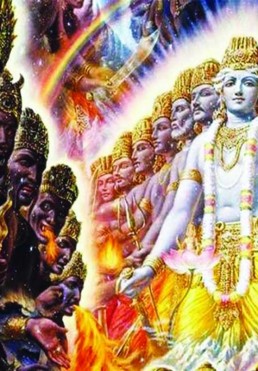On hearing such an exhaustive enumeration of the qualities in the good and the bad hearts, it will be natural for every sincere student of the Geeta to feel a despair not knowing whether he himself belongs to the latter or the former category. Generally, one would find it easier to consider oneself bad rather than feel the confidence that one belongs to the good. Arjuna must have felt the same despair and, perhaps, reading this in his face, Krishna consoled him: “GRIEVE NOT, O PANDAVA! YOU ARE BORN OF THE DIVINE ESTATE.” That a seeker has the necessary interest and perseverance to read the Geeta up to this chapter, itself shows that he belongs to the ‘DIVINELY-GOOD’ category!
Both the ethical beauties and the non-ethical ugliness are painted here not for the purpose of sending the good to an eternal heaven and of damning the vicious to a perpetual hell! Here, the theme is taken up on a more scientific basis. Ethical virtues are the intelligent ways of reviving man’s exhausted energies and fatigued spirit to live. By living these healthy values of a righteous life, the individual unshackles his psychological personality from its self-made entanglements: “THE DIVINE ESTATE LEADS TO RELEASE.” As a contrast to this, the negative tendencies cultivated by the ‘Diabolically Fallen’ are self-made shackles that chain a man to a realm of confusions and sorrows, forbidding him to grow into the ampler fields of his own inner possibility: “THE DEVILISH TO BONDAGE.”
GRIEVE NOT (Maa shuchah) — To become sentimental and desperate or to exhaust oneself in self-pity, or self-condemnation, is a psychological malady, and one suffering from it can never discover in oneself, the energising cheer, the sustaining confidence, and the steady will that are required for an intelligent self-diagnosis and an effective self-cure. To a seeker, living the ethical values is, in itself, a kind of treatment to cure him of some of his personality-diseases. To the Hindus, a sinner is not a dangerous mental leper, or a failure of the Omnipotent Lord. To a Vedantin, Satan is not a perpetual challenge to God.
The good, contaminated by weakness and ‘ignorance,’ is the evil. And the evil, when cured of ‘ignorance,’ itself becomes the good. A looking glass covered with dust, cannot reflect light, and mirror properly the objects in front of it. This is not because the glass has lost its capacity to reflect, but because its effectiveness has got veiled at present by the accumulated dust, which is essentially something other than the glass. To wipe it clean is to bring forth from it more clarity and light for the reflection. A ‘Diabolically Fallen’ one has also the same Infinite Light of Pure Wisdom — but alas, extremely dimmed by false values and wrong concepts in his bosom.
TAKING UP THE ‘DIABOLICALLY FALLEN,’ KRISHNA SCIENTIFICALLY ANALYSES THEIR MENTAL CONTENTS, AND THEY ARE SEPARATELY OBSERVED AND STUDIED IN THE FOLLOWING STANZAS:

